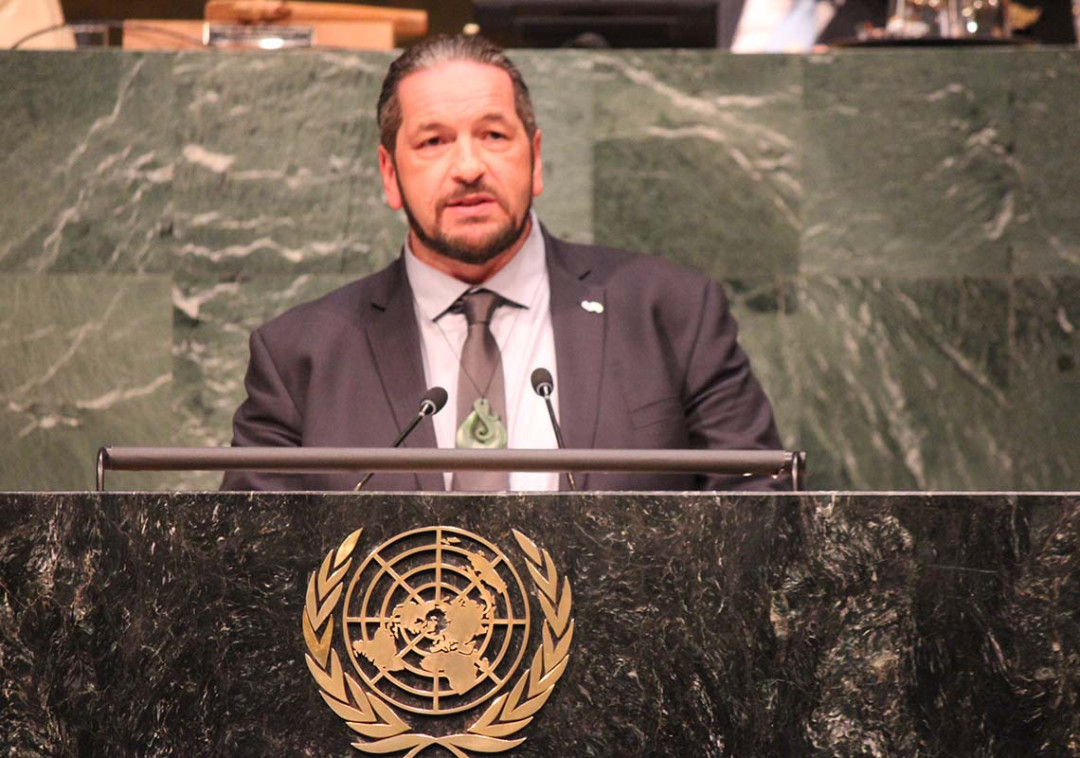Opinion: Telling it like it is

What does the world look like when kindness and concern for others triumphs over moralising and a punitive ideology? At the UN’s big drug hui, Drug Foundation chair Tuari Potiki set out a vision for a world where people get the support they need, not punishment. The speech was made on Thursday 20 April, under the auspices of UN resolution 70/181.
Tēnā ra koutou katoa
Ko Aoraki te mauka
Waitaki te awa
Kāi Tahu te iwi
Ōtākou te marae
He mihi tēnei ki a koutou aku rangitira
He mihi ano ki te mana whenua o tēnei rohe
Tēnā ra koutou
Greetings. Sometimes, when we are threatened, we go to war, and sometimes we go to war against our own people. If we decided to wage war against cancer, would we do that by bombing the people who have cancer?
Many nations have joined up to wage a war against drugs and have ended up attacking and harming people who really are in need of our help and our support. I started using drugs when I was 13 years old, and when I was 28 years old, a judge gave me a choice – to get help for my drug problem or go to jail. That was 27 years ago. I had a judge who could see that the reason I kept standing before him was ultimately because of my drug use. He could see that I needed a health intervention rather than a criminal justice one, and he sent me to treatment for my drug problem.
And because treatment works, I stand here today as Chair of the New Zealand Drug Foundation, as Director of Mäori Development at Otago University and as having not used drugs for 27 years. My journey was supported, like my predecessor, by essential harm-reduction services, including opioid substitution therapy with methadone. And it’s also included screening and then treatment for hepatitis C.
You are here to discuss the world drug problem, but many of you directly contribute to that problem by denying your citizens access to the vital support such as harm reduction, the support that saved my life. You are actively blocking progress towards providing help to those who most need it. I believe that, if you are not part of the solution, then you’re part of the problem and that a major part of the world drug problem are those countries that continue to block progress towards compassionate, proportionate and health-focused responses to drug use and drug users.
So the first thing I ask for in standing before you today is to stop punishing people who need our help. We’ve got to stop criminalising people who need our care and support.
I am Kāi Tahu Māori from Ōtākou, Te Waipounamu New Zealand. We are the first people of that land. We have a history of colonisation, disposition and deprivation, and deprivation has consequences.
When we focus only on drug use, on problems people present with, when we don’t ask questions about the wider, broader picture – the why – we can miss so much. My problems didn’t start the day I picked up a needle. They went much further back. And this is a story you will hear many, many times, and particularly from indigenous people.
In New Zealand, Māori make up 15% of the population but are 51% of our prison population, and 40% of those are in there for drug offences. You see the same pattern in Australian Aboriginals, Native Americans, Native Hawaiians, Alaskans, indigenous peoples from all over the world – high levels of drug use and high levels of drug-related harm. It’s no accident.
As indigenous people, we have the solution to our problems, including our drug problems. In your outcomes document, you rightfully acknowledged the importance of the Declaration on the Rights of Indigenous People, but that puts obligation on you to include us in your discussions and policy decisions that affect us. So I ask that, from this UNGASS forward, the unique perspectives and views of indigenous and First Nations people are sought and included. Finally, if there is a war to be fought – and I believe that there is – it should be a war on poverty, on disparity, on dispossession and on the multitude of political and historical factors that have left and continue to leave so many people vulnerable and in jeopardy.
We also need to acknowledge that the people we’re all here talking about are our sons, our daughters, our brothers and our sisters. And if you think just for a minute how would you want your son or daughter to be treated if they developed a problem with drugs, then the way forward becomes very, very clear.
Nō reira, tēnā ra koutou and thank you.
Recent news

Reflections from the 2024 UN Commission on Narcotic Drugs
Executive Director Sarah Helm reflects on this year's global drug conference
What can we learn from Australia’s free naloxone scheme?
As harm reduction advocates in Aotearoa push for better naloxone access, we look for lessons across the ditch.

A new approach to reporting on drug data
We've launched a new tool to help you find the latest drug data and changed how we report throughout the year.

